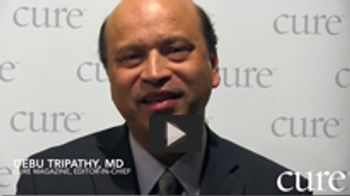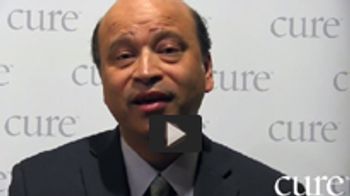
The anticipated approval of Ibrance (palbociclib) came two months ahead of expectations, as the FDA granted an accelerated approval to the drug as a frontline treatment for women with ER-positive, HER2-negative metastatic breast cancer.

The anticipated approval of Ibrance (palbociclib) came two months ahead of expectations, as the FDA granted an accelerated approval to the drug as a frontline treatment for women with ER-positive, HER2-negative metastatic breast cancer.

A new study has found that while the breast cancer prevention drug tamoxifen's benefits outweigh its risks, the drug isn't right for all women.

Every day, breast cancer researcher Edith Perez sets her mind on finding better treatments for the disease and conducting research aimed at improving patients' lives.

Journalist Joan Lunden shares her experience with breast cancer, side effects and working through treatment.

The emotional fallout of cancer takes a heavy toll. Experiencing your feelings in your own way, at your own pace, can be a challenge.

Two recent studies outline the importance of nutrition in preventing obesity-related cancers, as well as the potential benefits of a nutrition education intervention in preventing breast cancer recurrence.

Roy Firestone interviews longtime journalist, author and television host Joan Lunden on her recent breast cancer diagnosis and treatment.

Those of us living with metastatic cancer ride a see-saw between hope and acceptance.

Beth Overmoyer, a breast oncologist at Dana-Farber Cancer Institute, speaks on the results of the SOFT trial and its potential impact on young women with hormone receptor-positive breast cancer.

Women with hormone receptor-positive breast cancer who remained premenopausal after receiving chemotherapy had a lower risk of disease recurrence when adding ovarian suppression to adjuvant Aromasin, according to results from the phase 3 SOFT trial.

It's taken me a while to accept that it's OK to not be OK. Sometimes the only way to keep moving forward is to stop and have a pity party first.

The Food and Drug Administration's calendar for making decisions on new cancer drugs and indications is taking shape for 2015, and the clock is ticking on at least 13 applications for novel agents and new therapeutic settings for existing drugs.

Results of a phase 2 study showed that women with small, stage 1 HER2-positive breast cancer who received a combination of lower-intensity chemotherapy and Herceptin following surgery were highly unlikely to have a recurrence.

When was your last truly remarkable New Year's Eve?

The mental challenges of having stage 4 breast cancer are just as overwhelming as the physical ones.

The mental noise that comes with cancer is deafening. Taking cancer time-outs can quiet your anxiety.

Two HER2-targeting regimens anchored by Kadcyla (T-DM1) failed to outperform the standard strategy of Herceptin plus chemotherapy in women newly diagnosed with advanced HER2-positive breast cancer.

The addition of Avastin (bevacizumab) to standard neoadjuvant chemotherapy significantly improved pathologic complete response rates in women with basal-like breast cancer compared with non-basal-like subtypes.

Faslodex (fulvestrant) improved overall survival by nearly six months compared with anastrozole as initial hormone therapy for postmenopausal women with estrogen receptor-positive advanced breast cancer, according to findings from the phase 2 FIRST trial.

Dr. Mary Claire King's search for the breast cancer gene spanned 20 years.

Findings from a long-term analysis of the Women's Intervention Nutrition Study (WINS) show that the deaths of women with hormone receptor–negative breast cancers were reduced by up to 54 percent when they followed a program to reduce their dietary fat intake, which could provide benefit for patients with triple-negative breast cancer.

Debu Tripathy reports on recent studies involving hormone therapy in estrogen receptor-positive breast cancer.

Debu Tripathy,editor-in-chief of CURE magazine, explains the importance of chemotherapy studies presented at the 2014 San Antonio Breast Cancer Symposium, including new data on the impact of side effects.

Karen Durham never expected to be speaking on behalf of the Metastatic Breast Cancer Alliance

The PD-1 inhibitor Keytruda (pembrolizumab) has demonstrated promising clinical activity with an acceptable safety profile in heavily pretreated patients with recurrent metastatic triple-negative breast cancer (TNBC).